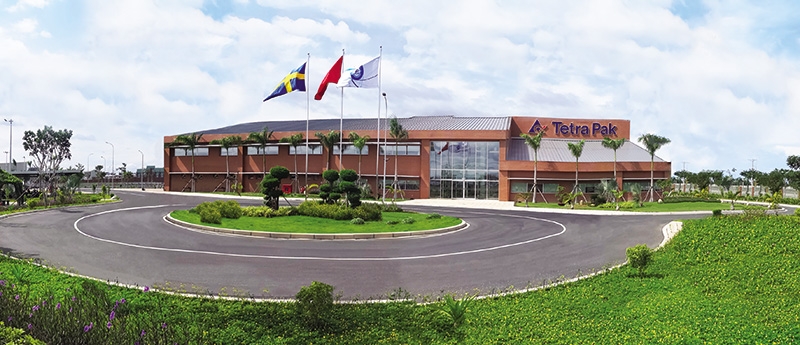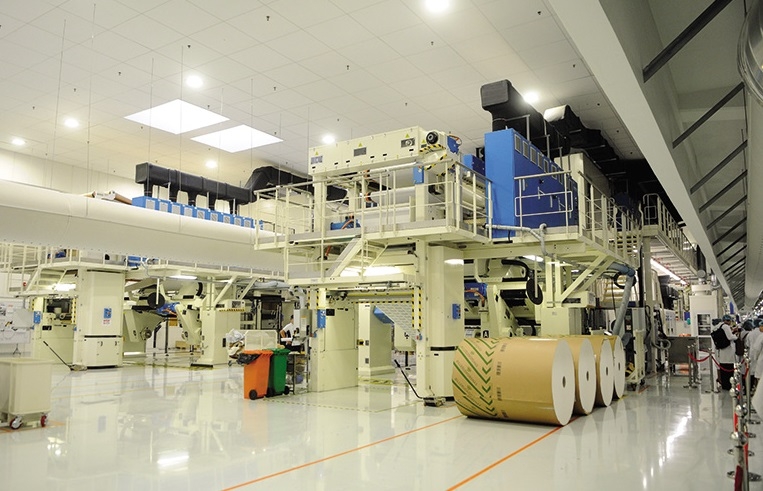Hyper-modern factory for silver jubilee
 |
| Tetra Pak’s new Binh Duong factory is a highlight of the corporation’s sustainability commitment in Vietnam |
Last week, Swedish packaging company inaugurated the first factory for carbon packaging materials in Vietnam, located at Vietnam-Singapore Industrial Park 2 in the southern province of Binh Duong. The manufacturing plant, which took 20 months of intensive construction to complete, is valued at €120 million ($135.3 million). This is the eighth factory for Tetra Pak in the Asia-Pacific region, and also the first one since 2011. The new manufacturing facility is set to produce aseptic cartons for Vietnam and also the ASEAN, Australia, and New Zealand, marking Vietnam as an important global production site for Tetra Pak.
The region’s production hub
 |
As part of the celebrations for this new factory, Tetra Pak’s president and CEO Adolfo Orive paid a week-long visit to Vietnam, travelling across the country to understand the fast-growing market. Orive, who was appointed as the global chief leader in April, told VIR that he deliberately chose Vietnam as the first destination for his overseas visit. Three months into the job, Orive said that he was excited to see for himself the dynamic market where Tetra Pak has decided to set up a factory.
“There’s huge potential in the country with young and growing consumers, strategic location, and a stable economy. We strongly believe in the future of Vietnam, which is why we invested in the new factory here,” said Orive. The CEO emphasised that the new factory is part of Tetra Pak’s commitment to deliver what local and regional customers need.
The Swedish company which is present in 160 countries, strives to be part of the local community wherever it goes. By opening the new Vietnamese factory, Tetra Pak has made it clear that localisation is an integral part of its expansion strategy. The others, according to its executives, are digitalisation, sustainability, and personalisation.
“Personalisation is actually part of digitalisation. We see customers in Vietnam demand personalised products and solutions for their own, and to be successful in Vietnam, we need to understand very clearly what local consumers want,” said Orive. The CEO added that during his week-long trip around the country, he was fascinated to learn about how segmented food and beverage products in Vietnam can be. Specifically, customers now demand different products for each family member, which needs to be tailored to their exact requirements on taste, packaging, size, and flavour.
When asked by VIR about what makes Tetra Pak stand out in Vietnam’s food processing and packaging sector, Orive emphasised that the company is the only end-to-end supplier in the industry, not just in Vietnam but around the world. In other words, Tetra Pak prides itself in providing products and services in the entire supply chain, from cows in the farm to a finished milk carton at supermarkets.
Another differentiation factor, said Orive, is Tetra Pak’s intense localisation efforts in Vietnam throughout the past 25 years, which stays true to its “four pillars” philosophy. The new factory in Binh Duong is hailed as a prime example of localisation, as it employs 220 local talents and caters primarily to the domestic market. 60 per cent of this manufacturing plant remains unutilised, which paves the way for future investments and expansions.
Currently, the majority of materials at the Binh Duong factory are imported, as Tetra Pak wants to comply with its global safety standards. However, the firm’s senior executives reassured that they are actively looking to use more local materials, especially as domestic suppliers grow.
“Whenever these requirements are met locally and we have a choice, we have a preference for any such local or regional suppliers. In this case, we are still evaluating the possibility of local supplies,” said Jeffrey Fielkow, managing director of Tetra Pak Vietnam.
 |
| Tetra Pak’s Binh Duong factory is one of the first in the country to apply for LEED Version 4 Gold certification |
A quest for sustainability
The new Binh Duong factory is also a shining example of Tetra Pak’s commitment to sustainability in Vietnam. It is one of the first factories in the country to apply for the LEED Version 4 Gold certification, which set the world’s highest standards for green buildings. To be qualified for this certification, Tetra Pak has applied various measures in different aspects, such as an energy monitoring system and water recycling facilities. Early tests show that the Binh Duong factory can reduce its energy usage by up to 36 per cent and reuse over 21 million litres of water a year.
In addition, the production and warehouse facilities are climate-controlled to ensure the highest quality of carton packages. The manufacturing plant also implements key certifications for quality, environment, and safety. Right before opening this factory, Tetra Pak has pledged to found the “Packaging Recycling Organisation” with eight other food and beverage giants, in an effort to promote Vietnam’s circular economy. Sustainability is not a choice anymore for producers but rather a non-negotiable expectation from the industry. From using fully recyclable materials to partnering with non-governmental groups and furthering the sustainability agenda in Vietnam, Tetra Pak is striving to prove itself as a pioneer in this area. The Binh Duong factory is an important aspect of this strategy.
Responding to VIR queries about the impact of Industry 4.0 on the Binh Duong factory and Tetra Pak as a whole, executives replied that the entire industry is now being transformed by cutting-edge technologies, which include big data, Internet of Things, artificial intelligence, and augmented reality. At the Binh Duong factory, the firm installed a highly-automated slitting machine, one of the first such pieces of equipment in Vietnam.
Fielkow also explained that both in the field and at customer sites, Tetra Pak’s engineers use Industry 4.0 solutions that provide them with real-time access to line performance data, allowing them to proactively monitor and identify issues. Remote support, backed by augmented reality solutions and applications, can speed up the problem-solving process. Traceability also becomes easier thanks to QR codes. Tetra Pak is looking to promote the concept of “connected packages” to consumers in Vietnam, as it currently does worldwide. For example, interactive packages manufactured by Tetra Pak can soon provide in-depth information about the product (including traceability), boosting brand engagement opportunities and facilitating online purchases.
“We see digitalisation and Industry 4.0 as an opportunity to bring more value to our customers and the food industry. It will make us more efficient and save costs, through connectivity, smart manufacturing, and digital solutions, whilst helping us to reduce environmental impact,” said Fielkow.
What the stars mean:
★ Poor ★ ★ Promising ★★★ Good ★★★★ Very good ★★★★★ Exceptional
Related Contents
Latest News
More News
- Masan Consumer names new deputy CEO to drive foods and beverages growth (February 23, 2026 | 20:52)
- Myriad risks ahead, but ones Vietnam can confront (February 20, 2026 | 15:02)
- Vietnam making the leap into AI and semiconductors (February 20, 2026 | 09:37)
- Funding must be activated for semiconductor success (February 20, 2026 | 09:20)
- Resilience as new benchmark for smarter infrastructure (February 19, 2026 | 20:35)
- A golden time to shine within ASEAN (February 19, 2026 | 20:22)
- Vietnam’s pivotal year for advancing sustainability (February 19, 2026 | 08:44)
- Strengthening the core role of industry and trade (February 19, 2026 | 08:35)
- Future orientations for healthcare improvements (February 19, 2026 | 08:29)
- Infrastructure orientations suitable for a new chapter (February 19, 2026 | 08:15)

 Tag:
Tag:



















 Mobile Version
Mobile Version